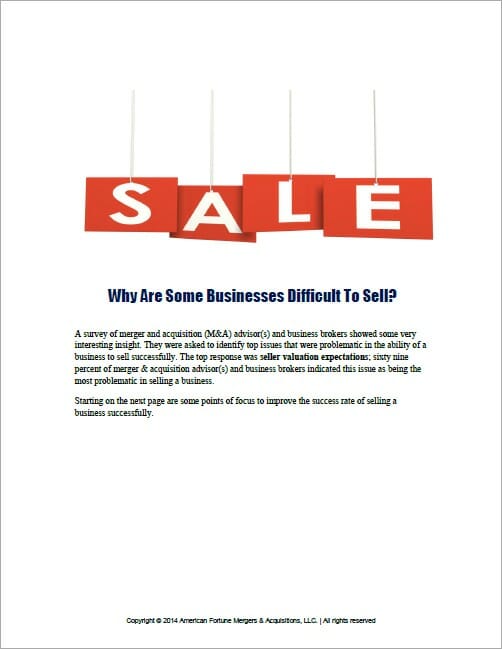Sale & Sale of Businesses Successfully With
Proper Preparation
The idea of a sale of businesses might seem daunting yet exciting! And your reasons for selling a business vary greatly: you are good at running your businesses but you do not have the knowledge and most of all the experience in the sale of businesses. So taking a look at what a good business broker or merger and acquisition adviser can provide is very prudent.
To prepare for sale of businesses for sale by owner carefully evaluate the scope of your new responsibilities and plan ahead whenever possible. The questions and answers below will help with this. They are the ones most commonly asked of Brian Mazar, CEO of American Fortune Mergers and Acquisitions, LLC and the founder of Business Sale Advocate. It’s his hope that the information provided on this website combined with the support of Business Sale Advocate will lead you to the successful sale of businesses!
Scroll through this page or click on any of the questions below to be taken directly to the answer:
What is the typical sale process? Answer: After a business has been adequately prepped to sell, it should be “taken to market”—to use the industry term. This means it should be marketed…and in as many ways as possible. Once buyers are aware of your business for sale and have expressed interest, the following steps are typical to selling a business:
i. Screening of buyer
ii. Signing of NDA (Non-Disclosure Agreement)
iii. Preliminary due diligence
iv. Acceptance of OTP (Offer to Purchase) or LOI (Letter of Intent)
v. In-depth due diligence
vi. Negotiations to finalize the deal
vii. Closing of sale
How long can you expect the sale process to take?
Answer: The time frame is variable. It could be weeks, it could be years. On average, a small business can expect this range to be 5 -18 months. Numerous factors determine how long it will take to sell your company and some of those factors, like industry demand and economic conditions, are out of your control. What you can do, though, is make sure your company is prepared to be sold. This can not be emphasized enough!!! Buyers will be attracted to companies that are ready to transition so be one of them!
The sale of a business independent of a broker has it advantages, one advantage is NOT the success rate. Several studies have shown that 30% of businesses taken to market by their owners do not sell. This is why it is so important to be well-prepared and well-informed. Exploring this site is a great start to give you a competitive edge.
How do you determine your asking price?
Answer: There are myriad ways to determine your company’s asking price. Some owners base it on what comparable businesses have sold for in the area, others on a price that they were offered for it a few years back. Still, others weigh such factors as the money they have invested, the businesses’ financials, inventory on hand, real estate, etc. and arrive at a suitable price. All these methods have been done. There is no rule book that states the correct or incorrect way to price a business. But some methods are more reliable than others.
We recommend obtaining a certified business valuation. Will it cost money? Yes. Typically anywhere from $500 – $6,000 depending on the amount of detail you request. And it’s worth it!
The best way to understand our belief in business valuations is to put yourself, for a moment, in the position of a buyer. As a buyer, would you prefer to begin negotiations with a seller based on an asking price that was done by an independent party, based on accredited formulas and regulations, and defensible OR one that was based on what the owner thought it was worth. Often, unbeknownst to them, such an estimate includes values placed on their emotional, financial, and time investments over the years.
If you answered “the owners’ value,” you are correct! A buyer would like nothing more than to pick-away at an asking price based on an owners’ subjective opinions. With a business valuation, this advantage is nullified because sellers can defend their asking price, stifle any ridiculous attempts to negotiate and tap the support of the third party evaluator to explain the asking price at any time.
How to prepare for a sale of businesses?
Answer: Most small business owners are so busy running the day-to-day operations of their company, they have little time to give consideration to the future sale of their business. But time is just what they need to maximize their eventual business sale. In fact, the process of preparing a business for sale should ideally begin three to five years beforehand. Some key things an owner should focus on to make their business as attractive as possible include:
- Standardize and document all company procedures
- Investigate transferability of leases and sales/supplier contracts
- Perform maintenance on company equipment to ensure good operating condition
- Secure key employees with employment contracts
- Eliminate non-performing or non-contributing employees from payroll
- Establish a management team that can operate without the current owner
- Reduce reliance on one or two large customer for the majority of sales
- Spruce-up the physical aspects of the business facility
- Have clean, verifiable financial statements for the past 3-5 years
- Ensure financial controls are established
How do you get the most $ from the sale of businesses?
Answer: There are two main areas you can focus on to maximize the value of your business: accounting practices and business operations.
Many businesses are run with the objective of minimizing tax liabilities. Smart move…until you wish to sell the business. Unfortunately, the same techniques and accounting practices that minimize taxes also minimize the value of a business. In order correct for this, speak with your accounting professional about adjusting your accounting practices for the 3-5 year period before you intend to sell.
During this same 3-5 year period, focus on fine-tuning your business operations in those areas that affect your valuation the most. These areas are: pricing, customer service, expenses, inventory, outsourcing and employees.
How can you protect your employees, your business’s future and your client relationships during the sale?
Answer: Managing the confidentiality of your business listing is the number one way to protect the interests of all involved. Rarely does it benefit a seller to advertise to the world that their business is for sale. Instead, focus on two main things to keep your business listing under wraps.
Screen your interested buyers: If an interested party calls to inquire about your business, refrain from disclosing business information too quickly. Instead, take time to screen your buyer before you share. Why do they find your business attractive? What is their previous work and business ownership history? How would they intend on funding a purchase? How involved do they want to be in the daily running of the business?
Enforce a NDA: It is very common for initial conversations with an interested buyer to be vague and fruitless until an NDA (non-disclosure agreement) is signed. So as to waste nobody’s time, once you’ve screened sufficiently, have the buyer sign an NDA. With the signed document in-hand, you can relax a bit knowing your confidentiality is now protected by law. But, make sure your NDA is adequate!
Will your accountant or attorney suffice for managing business negotiations?
Answer: You can get through the negotiations of your business sale by using a trusted accountant or attorney. The questions should be, “How well will my accountant/attorney be at negotiating the sale of my business?” and the answer would be, “Probably not that great.”
Here’s the thing, accountants and attorney’s are essential people to have in your corner. Without them, your business would be legally and financially vulnerable. You rely on their input for the topics they are experts in. But are they experts in buying and selling businesses? Do they do it every day? If your answer is “no” to either of these questions, consider speaking with a business broker, business adviser or a mergers and acquisitions firm. You don’t have to employ them, but just place a few calls and ask a lot of questions.
Educate yourself on what all these experts know. Ask questions of all of them. Questions like:
- What trends do you see in the current economic environment that might affect the purchase price of my company?
- Within what industries do you have the most experience negotiating acquisitions?
- Do you prefer buyers submit an Offer to Purchase or a Letter of Intent and why?
- Can you give me examples of negotiation difficulties you’ve faced in the past and you worked through them?
- Do you just take part in the negotiations at the end of due diligence or are you involved from the beginning?
Contact American Fortune Mergers & Acquisitions and experience market prices and superior expertise at https://www.sellmyusbusiness.com/
Clients utilized American Fortune in the sale of businesses in the following areas of the USA: Columbus Ohio, Atlanta Georgia, Lexington Kentucky, Bowling Green Kentucky, Nashville Tennessee, Memphis Tennessee, Cincinnati Ohio, Dayton Ohio,Toledo Ohio, Los Angeles, Cleveland Ohio, Pittsburgh Pennsylvania, Baltimore, Maryland, Indianapolis Indiana, Chicago Illinois, Detroit Michigan, Flint Michigan, Tampa Florida, St. Louis Missouri, Kansas City Kansas, Des Moines Iowa, Minneapolis Minnesota, Louisville Kentucky, Oklahoma City, Oklahoma, Dallas Texas, Fort Worth Texas, Denver Colorado, San Francisco California, Salt Lake City Utah, Phoenix Arizona, Lexington Kentucky, Los Angeles California, San Diego California. Our main offices are located in Los Angeles California, Louisville Kentucky and Detroit Michigan.







